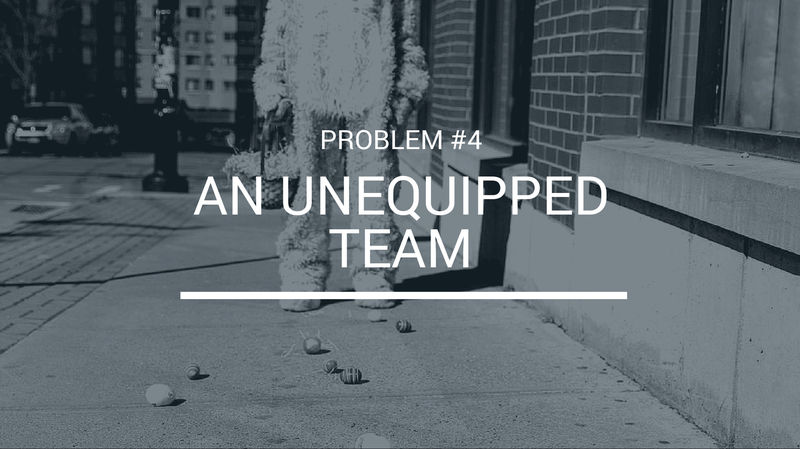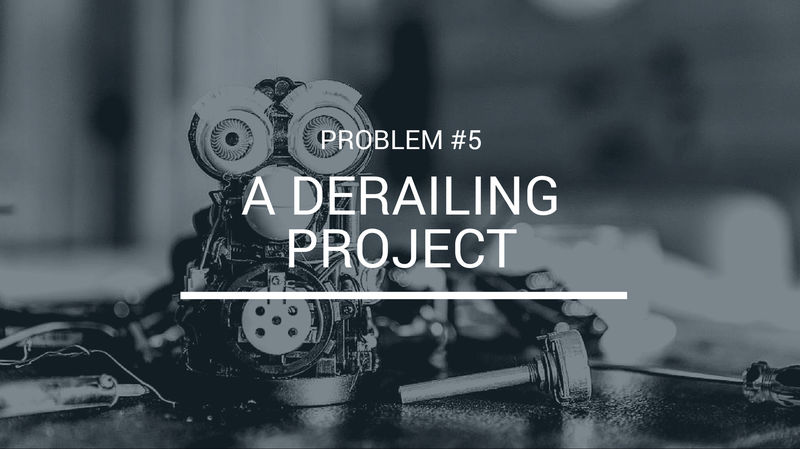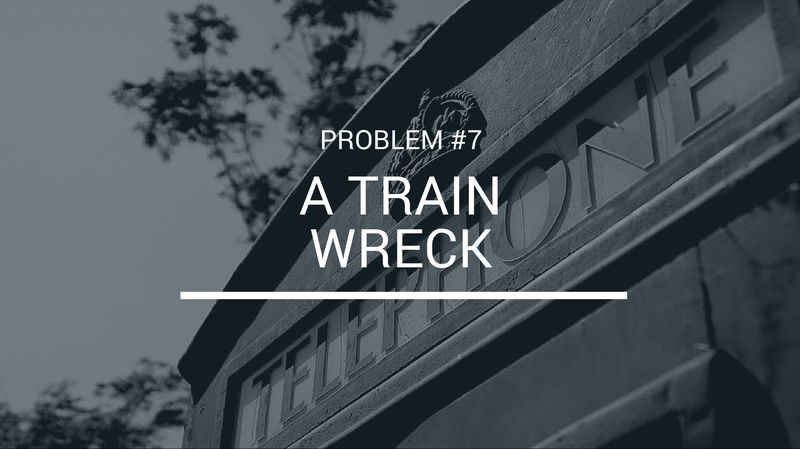
A Failed Project Gone Terribly Wrong ― And What I Learned Looking Back
This is part 2 of a 3 part series on financial debt. In part one, I shared how a zealous hiring caused us at Noodlehead Marketing to fall into debt. If you missed it, click here to read.
Did You Know We Almost Got Sued?
In the fall of 2010, I came face to face with a Sheriff for my first time. I was sitting down at my office desk when I looked over to see an officer in uniform enter. My eyes immediately darted away as my mind ran through numerous scenarios of why he was there. Bracing for the worst case scenario, I turned away hoping he wouldn't see me.The Sheriff was there to serve a notice our client was suing us. One of our projects had gone terribly wrong, and our client was suing Noodlehead Marketing for almost fifteen thousand dollars. In trying to downplay this event with the team, I quickly signed for the notice and continued working. I did not want anyone to panic or worry, so I blindly hoped my employees had not noticed this encounter. My mind continued to spin and spiral, and it was clear I could not avoid my mistakes any longer.
Then, what seemed like a gift from heaven, came a project to bridge the gap and keep us chugging along. From a sales point of view, it was a slam dunk as we were charging much less than our competitors. It was one of the easiest sales we ever made.
Unfortunately, the financial tension we were facing was not allowing us to review the situation objectively. It was a project outside our wheelhouse, and our decision to take the project ended up being a costly mistake. We were not equipped to deliver with excellence, and we were not ready to handle the demands of the client.
Because of the difficulty of this project and the client, we could have increased our chances of success if I led and managed the project, and if we hired experienced external resources to execute the project. Unfortunately we needed the money which left us unable to hire the external resources. Deep down, I knew this would end poorly, and so I distanced myself from the impending train wreck.
As expected, it was a difficult project with a demanding client. Our team was under powered and I put more and more distance between the client and myself.
Our incompetence and the client's domineering attitude made for a nasty soup. They paid us around fifteen thousand dollars and at a certain point of not making enough progress, they pulled the plug and asked for their money back. We went back and forth debating, which led to lawyers getting involved.
We had built what was in our contract, but we had set expectations above and beyond what our contract stated, and we were unable to deliver. By the letter of the law we could have defended ourselves, but in my heart I knew we had to face the situation head-on and pay for the consequences of our poor decision-making. It took time and extreme pressure, but our core values of excellence and accountability pushed us to face reality and make things right. A day before they filed the case in court, we agreed to reimburse them the money they had paid. When we started the project, we thought the money would help us. After reviewing the cost of paying the team, lawyers, and reimbursing the client, we came to realize, we were in a much worse situation than before. Not having the money to pay the client back, we thankfully agreed to a generous payment plan over the following two years.
We realized, our financial stress led us down a series of poor decision-making as we ignored warning flags, so we could get what we thought we needed. It was like we were hungry mice who needed cheese, and we were so hungry we chose to eat the cheese inside the mouse trap.
The first time we fell into debt came as a result of us grabbing hold and not letting go of something we wanted. In this situation, we ended up in debt because we grabbed a hold of what we thought we needed to pay our bills. There are situations we will face where we feel like we have to settle, compromise our values or do something we believe will end badly because of the pressure we are under. In these situations, we must learn to trust God for his provision and not take, what seems like, our only option. Otherwise, we can make bad decisions, indirectly leading us to do the very thing we committed not to do!
Are Your Wondering How To Respond Or Prevent A Situation Like This?
The following deconstruction is how I would approach this situation today. My intent in sharing is to provide guidance for us. When we are in these high stress circumstances, we can forget how to think straight. Guidance can direct us towards wise decision making.Problem #1: A Struggling Company

The first problem was our financial struggle. Our expenses were up, our income was down and projects were on hold. These five strategies can help resolve this problem.
Be Open With The Team & Our Spouses
When we are struggling, it can be wise for us to share openly with our team.
Fear and pride shackled me from sharing openly and asking for help. This was our burden to share, and my attempt to carry it on my own was hurting us. When we share the burden, it provides the opportunity for the team to share in growth of the experience.
When we choose to share, share with others as early as possible. The longer we wait, the worse problems tend to get. Pro-activity allows us the opportunity to change the trajectory of the situation.
Increase Sales Generating Activities
When we recognize our sales numbers are down, our activity and efforts to need increase immediately. Setting up a strategy, an action plan and accountability is crucial to move the needle. Sales initiatives can take months to bear fruit so the best time to start is today.When we have neglected this area, there is no great answer to recovery other than hard work and time. Be honest with friends, business partners and clients as they are likely willing to help us accelerate the process.
Move Projects Forward
Client’s paid us when we achieved project milestones. When projects are in a stand still, cash flow slows down. In these situations, it is helpful to list our projects and the amount of money owed for upcoming milestones. Identify the obstacles hindering the project from moving forward, and assign the actions to team members. Meet daily for accountability. We act where we have control to move projects forward.Cut Expenses
When business is going well we can slowly add expenses to our budget. These types of scenarios are great times for a financial audit. Let’s discover what expenses we can minimize or remove. The earlier we act on this, the more money we are able to save.While this solution won't stop the bleeding, it will definitely slow it down.
Stick With The Plan
The strategies listed above are fairly simple and straightforward. In fact, we executed them successfully on many occasions. Unfortunately, once our circumstances got better, the pressure relieved and we reverted to our old ways. Let’s make a decision to commit to act when circumstances are good and when they are bad.Trust God & Let Go
We can do everything we can possibly think of, but there are times when circumstances deter our success. Let’s do what we can, let go, and trust God to provide. On numerous occasions, he provided for us when we desperately needed it.
Problem #2: A Questionable Project

Questionable projects are going to show up. They may be questionable because of the expectations, the technical requirements or our abilities to fulfill them. Regardless of the reason why, we ought to be diligent when they come our way. The following two strategies to help resolve this problem.
Start Slow, Test The Waters & Be Humble Enough To Quit
Test the waters before jumping in. In this case, we rushed to get the project moving. In a situation where there are flags, slowing down can be a wise course of action. We did start the project with a paid discovery process. Unfortunately, it was a fairly new process and the team member fulfilling it was not properly equipped. The discovery did allow us to experience the client, their expectations and our technical limitations. A good step, we should have quit the project after experiencing negative dynamics.
Address The Concerns, Don't Avoid Them
When concerns, questions and problems arise, we ought to address them with the team and client. When we are concerned about our ability to execute on a project, we ought to make the client aware of this. Let this be a collaborative process, leading to wiser decision making. In a situation where we are unable to let go, adjust or quit, the client can be a tremendous help. We may have to swallow our pride, but better to do this than face more severe consequences later.
Problem #3: A Distant Leader

Whether we are the distant leader or we are following one, this problem can be a significant hindrance to our success. When we find ourselves or others taking steps to create distance from an active or impending conflict, this ought to be a red flag we quickly respond to. Below is a strategy for when we are the distant leader, and the other is for when we are following one.
For The Leader: Face Reality
Denial can feel like a safe place, but it is deluding us as a catastrophic consequence is brewing. When we are pulling away from a problem, we need to stop and talk to someone. We can start with our journal or a stranger, if we are afraid. From there, let’s work up to our team and client. When we are afraid, let's face the problem with someone willing to face it with us. The earlier we do this, the less severe the consequences tend to be. When we wait, our abandonment requires us to pay back our debt, and note, there will be interest.
For The Follower: A Call To Accountability
When we are following a distant leader, it can get uncomfortable. When we are in this situation, we need to go to the leader and communicate clearly and consistently. When they are avoiding or escaping the situation, let’s ask a team member to join us in confront them. When they continue to ignore us, let’s find an authority we respect, like a consultant, friend, or client, to help us. At the end of the day, we can't force a distant leader to draw near, but we can put pressure on them to do the right thing.
Problem #4: An Unequipped Team

Going into a project unequipped and undermanned can feel daunting, and for us, it was a major contributor to our failire. When we find ourself in this situation, here are three strategies to get back on track.
Give It Everything You Got
At the end of a project, we want to look back without regrets. Let's do our best and communicate well. There are times we have gone into a situation seemingly doomed to fail, and it ended well. We don't know a project will fail before we start and our involvement may tip the project towards success. In the event the situation ends poorly, we can be confident we did everything we could to succeed.
Call For Reinforcements
When we need help or are unable to do something, let’s ask for reinforcements. When we get a no to our request, let’s keep asking. When we are denied, don't complain, and do our best.
Ask The Client For More Resources
This may be difficult and humbling, but we may need to ask the client for more money. When the project has grown in scope or we have underestimated the resources required to finish the project, we need to reconcile this reality with the client. When we manage the project and communication well, this is easier.
Problem #5: A Derailing Project

When our project is derailing and there is nothing we can do to stop it, we need to lean in and do whatever we can to lessen the blow. Here are three strategies to respond.
Raise The Flag With The Team
When the project is derailing, let’s immediately address it with the team. Get grounded and assess if the project truly is unraveling. If it is, let’s discuss our options and how we can respond.
Go To The Client Immediately
Once we know the project is unraveling, we need to go to the client immediately. This may be difficult and uncomfortable, but it is better to do this than wait for the Sheriff to show up. Share the situation and discuss our options.
Quit The Project
If there is not a reasonable way to get the project back on track, it may be best to intentionally abandon the project. It will require we swallow a large amount of our pride, but it could save us time and money. When we act in this way, we need to do what we can to make it right with the client. While it may cost us severely, they are more likely to be merciful here than when the train has crashed.
Problem #6: A Demanding & Difficult Client

Running into difficult and demanding clients happens to us all. They tend to make projects more difficult than they ought to be, and when we are struggling to execute, they are traumatic. Here are three strategies for how to respond to difficult clients.
Look In The Mirror
When we are criticized, we need to look in the mirror. How they said what they said may be wrong and inappropriate, but we need to look at the seed of truth their statements came from. Let's look in the mirror, take responsibility and adjust our behavior to align with our values and vision.
Defend The Team
When our clients tear apart or beat up our team, we need to step up and defend them. If a client wants to respectfully address a team member or situation, we can allow it, but when they cross the line our team needs to know we will be there to back them up.
Call Out The Client
Accountability goes two ways. When our clients treat us poorly, we need to let them know it is unacceptable. This may be one of the most uncomfortable situations we face, but it is absolutely imperative we do it. The health of our team is more important than any client.
Problem #7: A Train Wreck (And Bodies Are Everywhere!)

When the train has crashed, there is little we can do except call the authorities and do damage control. Chaos ensues and emotions rise. Hold on tight, because it's about to get rough.
Call 911 & Make It Right
Call the client, now. Go to them if appropriate. Call our mentors and ask for help. Apologize to the team and ask for help. Reconciliation is our top priority so let's do what we can to make it right. Going to court is expensive and hurtful so let’s do what we can to resolve the situation.
Conclusion
By now we can see how costly and time consuming responding to a crisis is. Prevention is cheaper and easier.
Our commitments will minimize how we hurt each other and maximize our success in work.
- Created on .
- Last updated on .